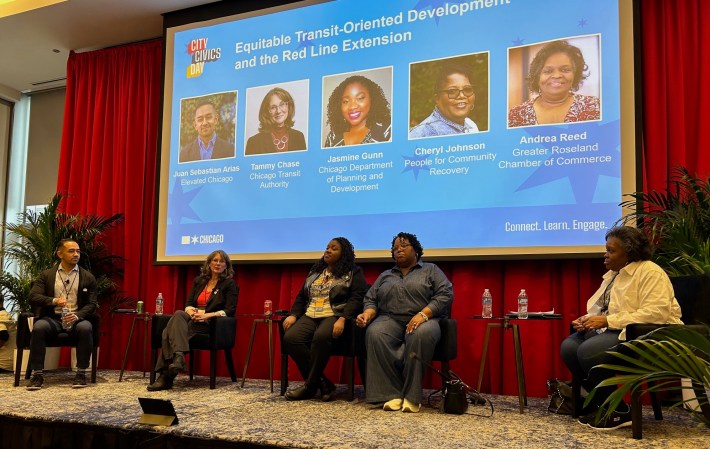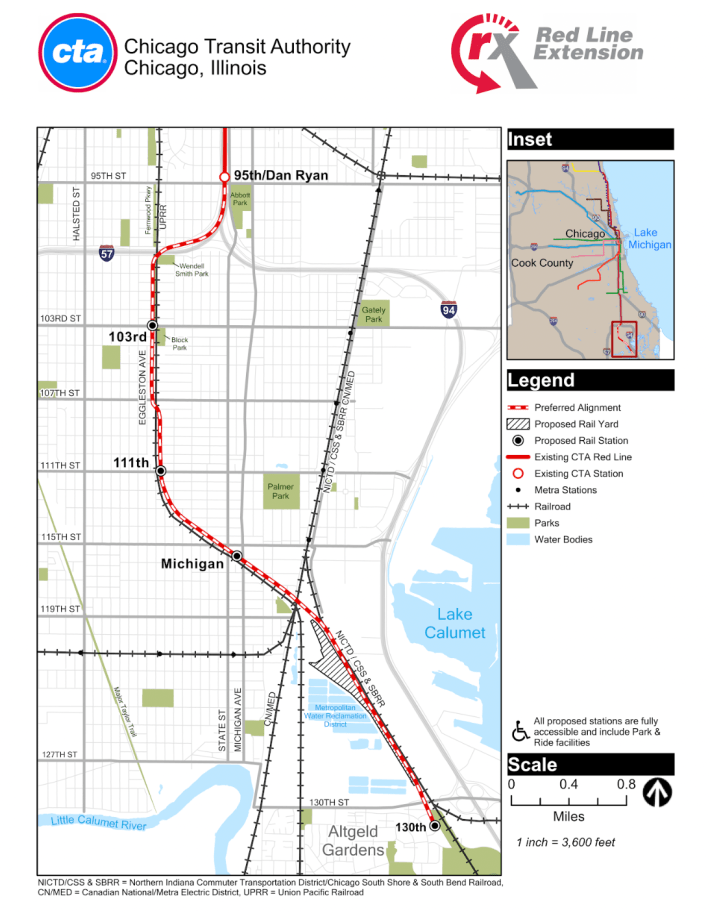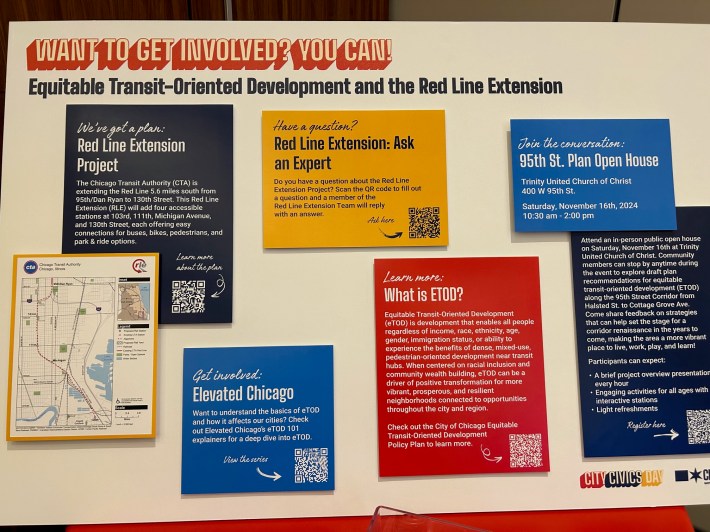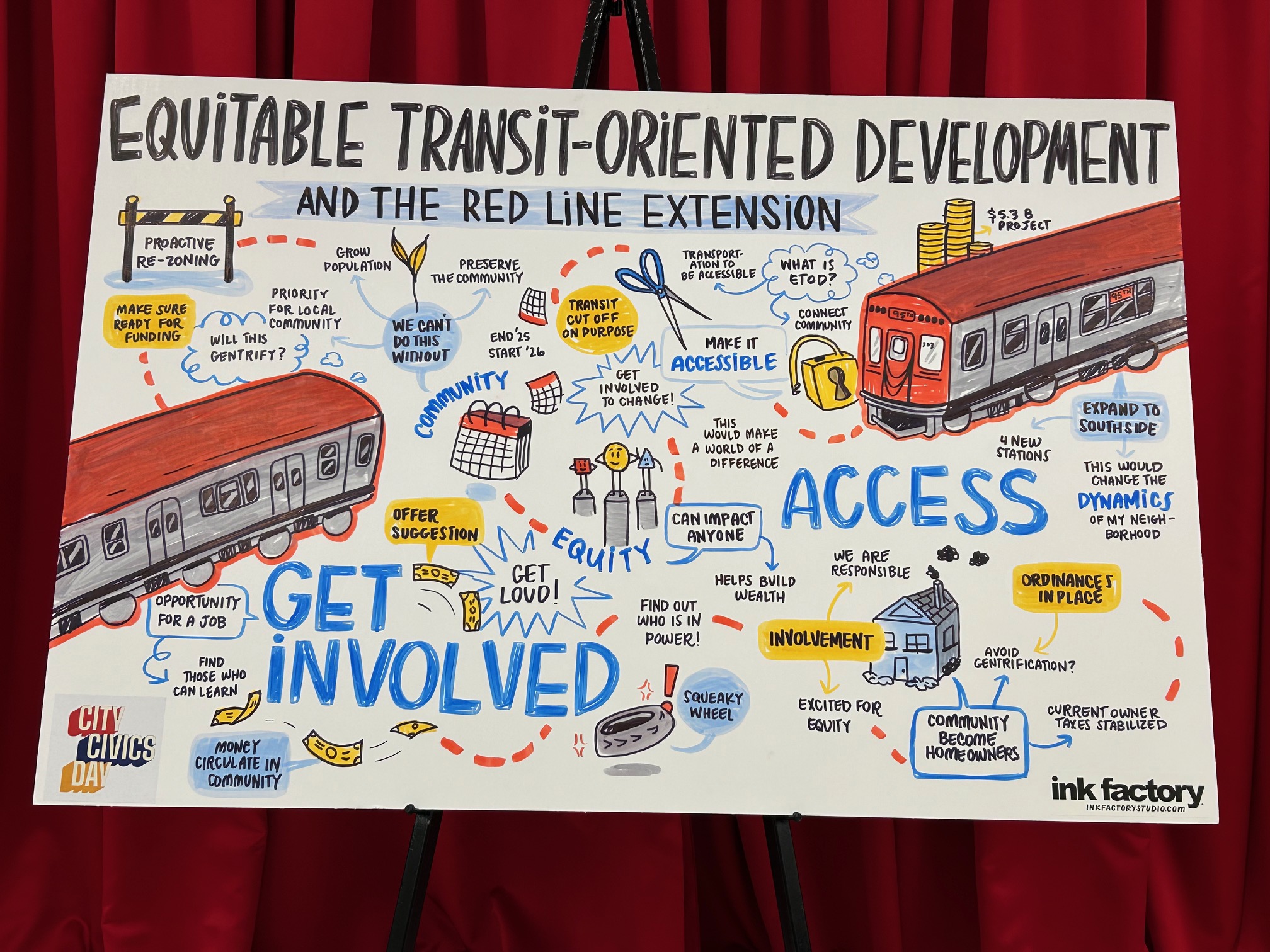The second annual City Civics Day, hosted by the Chicago Department of Planning and Development, and the Chicago Department of Cultural Affairs and Special Events, recently took place at Malcolm X College. The event was well-attended, and a session on equitable transit-oriented development and the long-awaited Red Line Extension project was standing-room only.
A panel of officials and advocates for the project was moderated by Juan Sebastian Arias, executive director of Elevated Chicago, a cross-sector ETOD advocacy organization. Panelists included CTA spokesperson Tammy Chase, DPD project manager Jasmine Gunn, and organizers Cheryl Johnson from People for Community Recovery, and Andrea Reed from the Greater Roseland Chamber of Commerce. An artist from Ink Factory was stationed to the left of the stage with a large whiteboard, live illustrating the discussion as it unfolded.

The Red Line Extension, which was originally promised half a century ago, will extend the 'L' route 5.6 miles south, adding four new stations and terminating at 130th Street. The project has had encouraging momentum in recent years. The CTA secured a $2 billion pledge for federal funding, plus tax-increment financing and bonds to cover the remainder of the now $5.3 billion budget. In August, the CTA signed a construction contract, and the project is slated to break ground late next year.

However, the outcome of the 2024 presidential election is putting pressure on the timeline. President-elect Donald Trump has threatened to cut off federal funding to sanctuary cities and has a track record of slashing funding for infrastructure projects. Block Club reported that, with the Federal Transit Administration conducting final reviews, the proposal may not come before President Joe Biden for signature until the final weeks, or days, of his term.
Even with national-level uncertainty hanging over the room, the focus of the panel at City Civics Day was on the gains made by grassroots activists and the importance of community involvement for new developments to earn the "E" in ETOD. Johnson, daughter of prominent environmentalist Hazel Johnson, lives in Altgeld Gardens on the Far South Side, the new terminus for the extended Red Line. Johnson talked about how transformative the project will be for her community.
"We consider ourselves isolated," she said. Altgeld Gardens residents must take the CTA 34 South Michigan bus from 130th Street to the 95th Street Red Line terminal to access the 'Red Line'L'. "This is going to change the dynamics of my community. Food desert, transportation desert, inequity housing, inequity education, the negative perceptions of our people because we live in public housing. Being treated as sub-citizens in the city of Chicago.”
"But I have to be conscious of, will this gentrify my neighborhood?" she added. "Equity needs to be defined by the community."
Several panelists mentioned the difficulty of engaging community members who have borne the brunt of gross disinvestment on a project that has been talked about for decades. Gunn said the number one question she heard in planning meetings was, "Is that Red Line [Extension] really happening?" The other concern was what will happen to longtime residents once the money pours in. "It needs to be a balance of preserving the existing community while growing the population that fits in naturally."
Gunn said that in 2025, DPD will be rezoning lots on the far South Side, many of which are restricted to single-family homes, to allow for mixed-use development. She also said the department will offer competitive grants to homeowners and entrepreneurs, with priority given to Far South Side residents.
Another issue discussed was how to ensure affected community members have access to jobs created by the Red Line Extension. Reed explained that public skepticism over the project has made it difficult to get turnout to employment sessions and apprentice training programs. "They don’t believe it’s going to happen," she said. "It would be devastating if the people in the community are not able to take advantage of this great opportunity."
Arias asked the panel for advice on how to get involved. Gunn said the more people organizers can engage in their communities, "the louder you can be, that’s where resources tend to flow."

"Read the room, check out who the power brokers are," Chase advised. "Who are the people you need to have regular conversations with?"
Johnson passionately spoke about the importance of civic involvement in the wake of school closures, razed public housing, and mental health facility closures. "We’re worried about the politician, but he ain’t nothing but a hoe to me: a tool to be used." Vocal appreciation rippled through the crowd.
"But if you’re not using that tool, how can you grow anything?" Johnson asked. "We’re just going to vote for him and then go back to our normal business. Then sit back and talk about what’s going on in the city of Chicago. We’re responsible when we leave this room."
During the question-and-answer session, one audience member asked how the proposed merger of the Chicagoland transit agencies might affect the Red Line Extension. Chase assured the crowd that the project would go forward. "The Red Line Extension will be built," she said. "I’m telling everyone in this room, we will build it. And finish it in 2030.”

Did you appreciate this post? Please consider making a tax-deductible donation, to help keep Streetsblog Chicago's sustainable transportation news and advocacy articles paywall-free.





